#Moral decay
Explore tagged Tumblr posts
Text

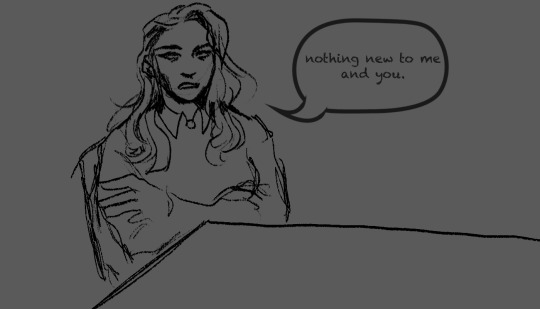
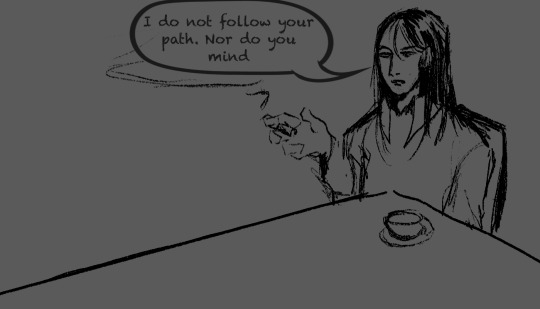
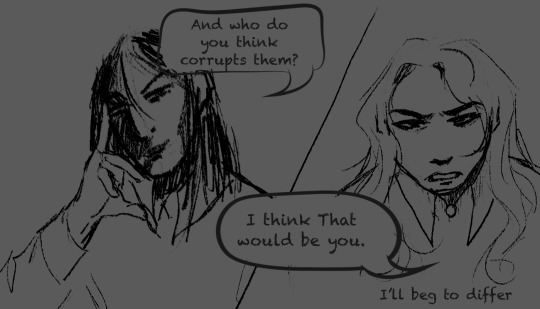
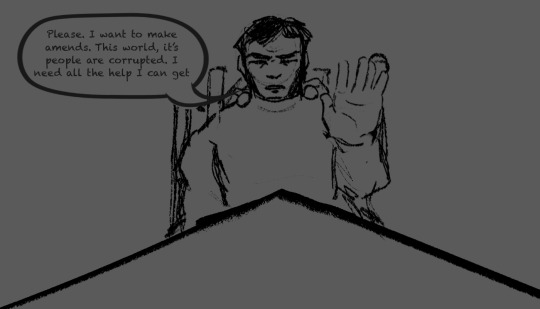

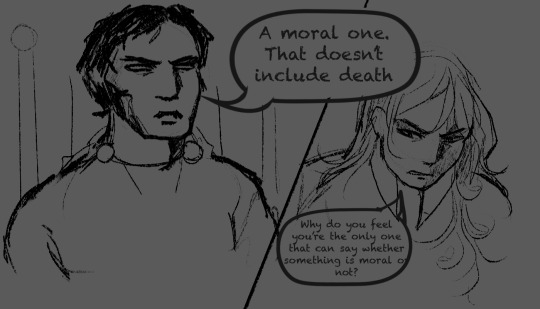
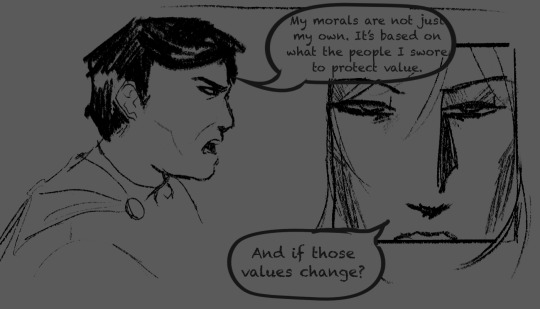
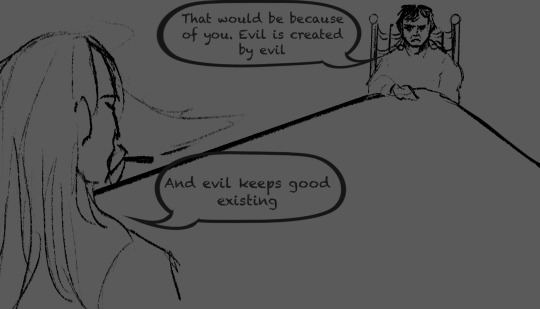

Hero , antihero, and villian comic idea.
1/3 First Part: The theory
Next
Hero, a powerful figure, haunted by a dark past and a mission to repay the world for his past mistakes. Villain, driven by hatred, seeks to manipulate and twist those around him, including Anti, a conflicted individual struggling with her own internal battles. As their paths intertwine, each must confront the darkness within themselves, setting the stage for a collision of ideals, power, and destiny.
#mini comic#comic art#original comic#comics#philosophy#literature#original art#original character#original post#first post#HAVbykill#original series#anti hero#hero#villian#character development#short story#original story#original stuff#dark fantasy#moral decay#moral dilemmas#narrative#phychology#phychological drama#fiction#existentialism#existential thoughts
14 notes
·
View notes
Note
Hello pretty, I'm sorry I bumped into your d.m so rudely, but it happened that you got suggested on my timeline, so I decided to hit your d.m with an inbox to know if you would be interested in being my sugar babe♥️, weekly allowance worth $3500, give me a feedback back if you're interested
Go crawl back under whatever filth you crawled out of. And take your pathetic scam, shove it where the sun never shines.
19 notes
·
View notes
Text
When Will Enough Be Enough?
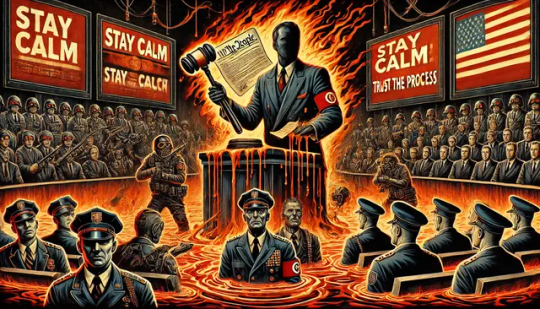
It would be so damn easy to stop this madness. We have the mechanisms—Congressional and military oaths, the UCMJ, constitutional authority—all of it designed for precisely this kind of moment: when a clear and present danger to the Republic emerges. And yet, what do we get? Nothing. Spineless platitudes, endless hearings that amount to nothing, and a collective shrug from those in power who have sworn an oath to protect this country. They have the ability—no, the duty—to act, but instead, they tiptoe around the edges, pretending the fire consuming our democracy is just another bad season of political theater.
The military, the politicians, the courts—they all cling to this farce of procedural propriety as if following the rules matters when the rulebook itself is being set ablaze. These are the same people who proudly invoke the Founding Fathers while utterly ignoring the revolutionary spirit of those men who risked their lives to create a system that wouldn’t be beholden to tyrants. They act like the mere suggestion of extreme measures is taboo, as if waiting for a magic moment of unanimous consent will suddenly fix everything. Newsflash: that moment isn’t coming. We’re already past it. The water is boiling, and instead of leaping out, we’re sitting here like morons, seasoning ourselves with denial and cowardice.
Let’s be clear: this isn’t just about one man or one movement. It’s about the absolute abdication of responsibility by everyone—the lawmakers who sit in chambers and bicker about decorum while the Constitution they claim to revere gets shredded; the judges who hide behind technicalities instead of delivering justice; the military brass who have forgotten that their oath isn’t just to follow orders but to defend the nation against all enemies, foreign and domestic. They know the stakes. They’ve seen the lines crossed, the norms obliterated. And still, they wait. For what? Permission? Consensus? A fucking parade?
Meanwhile, the citizenry is fed this endless, suffocating narrative that we must “avoid conflict” at all costs, as if conflict isn’t already here. It’s here in the erosion of our institutions, in the normalization of corruption, in the relentless assault on truth itself. This country was built on conflict when it was necessary to preserve freedom. Now, we cower in the face of it, deluding ourselves into thinking that restraint is virtue while the very fabric of our democracy frays to the point of no return.
At what point do we stop pretending this is business as usual? How much more blatant does it have to get? Do we need it in neon lights? Do we need a literal dictator standing on the Capitol steps declaring martial law before we acknowledge what’s happening? The fact that so many in positions of authority, with the power and the mandate to act, are choosing inaction isn’t just cowardice—it’s complicity. They are complicit in this decay, complicit in the destruction of the ideals they swore to defend. Their inaction is a betrayal—not just of their oaths, but of the people they serve and the generations yet to come.
There comes a point where the fear of doing something becomes far more dangerous than the act itself. We’re long past that point. Waiting only ensures the fall. So, to those with the power to act but who choose to sit on their hands instead: understand this. History will not remember your neutrality as wisdom. It will remember it as cowardice. And you will deserve every ounce of condemnation that comes with it.
#dystopian decay#authoritarian propaganda#institutional collapse#qmaga#maga#trump#trump 2.0#project 2025#death of democracy#apathy#moral decay#melting gavel#constitution#oath#military oath#foreign and domestic#UCMJ#unlawful orders#trump is a felon#justice#boiling frog#everything is fine#draft dodger#wannabe authoritarian#governmental paralysis#department of justice#revolution#resist#fight#not my president
13 notes
·
View notes
Photo
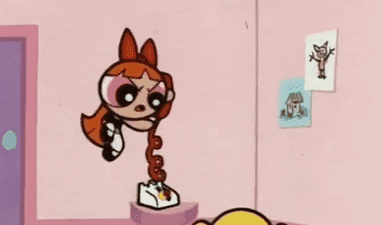

(via GIPHY)
#giphy#animation#cartoon#cartoon network#bubbles#my edit#blossom#powerpuff girls#ppg#buttercup#cartoon gifs#1990s cartoons#powerpuff girls 1998#cartoon network gifs#powerpuff girls gifs#powerpuff girls edit#powerpuffgirlsedits#my gifs#source: giphy#moral decay
40 notes
·
View notes
Text
"If I were the Devil"
Paul Harvey, the famous radio commentator, delivered "If I Were the Devil" in 1965. The piece is a reflection on how society could be led astray by moral decay and cultural deterioration. Harvey's hypothetical scenario outlines a plan the devil might undertake to lead humanity away from virtue.
"If I were the Devil"
If I were the Devil, I wouldn’t be happy until I had seized the ripest apple on the tree Thee.
So, I’d set about however necessary to take over the United States. I’d subvert the churches first. I’d begin with a campaign of whispers. With the wisdom of a serpent, I would whisper to you as I whispered to Eve: "Do as you please."
To the young, I would whisper, "The Bible is a myth." I would convince them that man created God instead of the other way around. I would confide that what is bad is good, and what is good is "square."
And the old, I would teach to pray after me: "Our Father, which art in Washington..."
And then I’d get organised. I’d educate authors in how to make lurid literature exciting, so that anything else would appear dull and uninteresting. I’d threaten TV with dirtier movies, and vice versa. I’d peddle narcotics to whom I could. I’d sell alcohol to ladies and gentlemen of distinction. I’d tranquillise the rest with pills.
If I were the Devil, I’d soon have families at war with themselves, churches at war with themselves, and nations at war with themselves until each, in its turn, was consumed. And with promises of higher ratings, I’d have mesmerizing media fanning the flames.
If I were the Devil, I would encourage schools to refine young intellects but neglect to discipline emotions—just let those run wild. Until before you knew it, you’d have to have drug-sniffing dogs and metal detectors at every schoolhouse door.
Within a decade, I’d have prisons overflowing. I’d have judges promoting pornography. Soon I could evict God from the courthouse, then from the schoolhouse, and then from the houses of Congress. And in His own churches, I would substitute psychology for religion and deify science. I would lure priests and pastors into misusing boys and girls, and church money.
If I were the Devil, I’d make the symbol of Easter an egg and the symbol of Christmas a bottle.
If I were the Devil, I would take from those who have and give to those who wanted until I had killed the incentive of the ambitious.
And what’ll you bet I couldn’t get whole states to promote gambling as the way to get rich?
I would caution against extremes in hard work, in patriotism, in moral conduct.
I would convince the young that marriage is old-fashioned, that swinging is more fun, that what you see on TV is the way to be. And thus I could undress you in public, and I could lure you into bed with diseases for which there is no cure.
In other words, if I were the Devil, I’d just keep right on doing what he’s doing.
#aul Harvey#If I Were the Devil#1965 broadcast#Radio commentary#Moral decay#Cultural decline#Society and ethics#Media influence#Moral values#American culture#Social commentary#Church and state#Religious values#Family dynamics#Moral philosophy#Traditional values#Social issues#Historical speech#Social reflection#Famous radio broadcasts#today on tumblr#new blog#quoteoftheday
2 notes
·
View notes
Text
The Way She Sits.

I'm concerned about her morals.

Pica! You need Jesus!
12 notes
·
View notes
Text
A Levite and his concubine
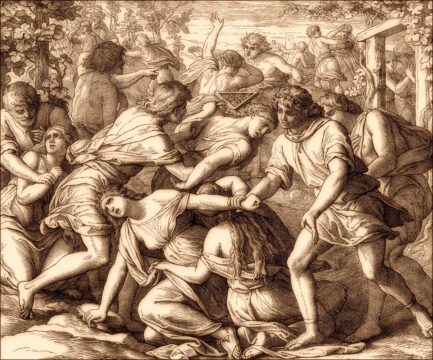
View On WordPress
#Bible#Compassion#Concubine#Events#Evil#God#Hospitality#Injustice#Israel#Judges#Justice#Lawlessness#Levite#Moral decay#Sodom
3 notes
·
View notes
Text
The Green Light of Illusion: Unraveling the Enigma of The Great Gatsby
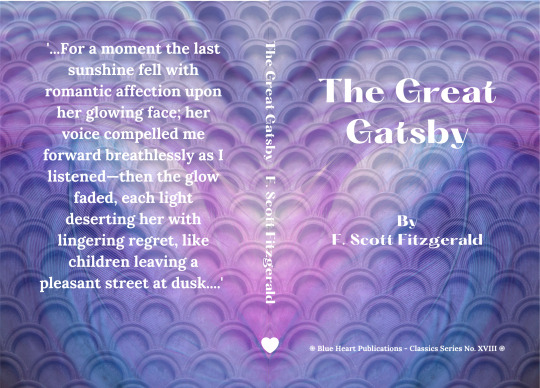
F. Scott Fitzgerald's "The Great Gatsby" is an intricate tapestry woven with the threads of illusion, reality, and the American Dream. Set against the extravagant backdrop of the Roaring Twenties, the novel unfolds through the eyes of Nick Carraway, a Yale graduate and veteran of World War I. Nick finds himself drawn into the enigmatic world of Jay Gatsby, a mysterious millionaire with an insatiable longing for the past and an unwavering pursuit of the unattainable Daisy Buchanan.
The novel is a vivid exploration of the Jazz Age, a period characterized by unprecedented economic prosperity, loosening social mores, and the pursuit of pleasure. Fitzgerald masterfully captures the excesses and superficialities of the time, using Gatsby's extravagant parties as a lens through which the emptiness of the era is exposed. The narrative subtly critiques the moral decay hidden beneath the glitz and glamour, revealing the fragility of societal values.
At the heart of the story is the elusive American Dream, personified by Gatsby's relentless quest for wealth and social status to win back Daisy, the embodiment of his idealized past. The green light at the end of Daisy's dock becomes a powerful symbol, representing both Gatsby's unattainable dreams and the broader illusion of the American Dream itself. Fitzgerald, with eloquence and insight, dissects the hollowness of the pursuit of material success and the ephemeral nature of happiness.
The characters in "The Great Gatsby" are meticulously crafted, each representing a facet of society during this tumultuous period. Gatsby, with his enigmatic persona, stands as a tragic figure emblematic of the illusions people construct to shield themselves from harsh realities. Daisy, a symbol of fleeting beauty and privilege, remains forever out of reach, a mirage that fuels Gatsby's relentless yearning.
Nick Carraway, the novel's narrator, serves as a moral compass, providing a lens through which the reader witnesses the moral decay and the disintegration of dreams. His observations and reflections paint a nuanced picture of the characters and the society they inhabit.
The prose in "The Great Gatsby" is a literary marvel. Fitzgerald's writing is both lyrical and incisive, capturing the essence of an era with a keen eye for detail. The novel's themes of illusion, disillusionment, and the pursuit of an unattainable ideal reverberate through the eloquent prose, making it a work of enduring significance.
"The Great Gatsby" is a timeless exploration of the complexities of the human spirit, societal expectations, and the elusive nature of the American Dream. Fitzgerald's critique of the Jazz Age resonates across generations, inviting readers to ponder the universal themes of love, loss, and the relentless pursuit of dreams.
F. Scott Fitzgerald's "The Great Gatsby" is available in Amazon in paperback 13.99$ and hardcover 20.99$ editions.
Number of pages: 290
Language: English
Rating: 9/10
Link of the book!
Review By: King's Cat
#Roaring Twenties#American Dream#Illusion vs. Reality#Jazz Age#Jay Gatsby#Daisy Buchanan#Nick Carraway#Wealth Disparity#Social Critique#Unattainable Dreams#Extravagance#Moral Decay#Symbolism#Green Light#Social Class#Materialism#Lost Generation#Love and Obsession#Tragedy#Socialite Lifestyle#Prohibition#New York Society#Excess and Decadence#Disillusionment#Romantic Idealism#Pursuit of Happiness#Loyalty and Betrayal#East Egg and West Egg#Character Complexity#Hedonism
4 notes
·
View notes
Text
The Green Light of Illusion: Unraveling the Enigma of The Great Gatsby

F. Scott Fitzgerald's "The Great Gatsby" is an intricate tapestry woven with the threads of illusion, reality, and the American Dream. Set against the extravagant backdrop of the Roaring Twenties, the novel unfolds through the eyes of Nick Carraway, a Yale graduate and veteran of World War I. Nick finds himself drawn into the enigmatic world of Jay Gatsby, a mysterious millionaire with an insatiable longing for the past and an unwavering pursuit of the unattainable Daisy Buchanan.
The novel is a vivid exploration of the Jazz Age, a period characterized by unprecedented economic prosperity, loosening social mores, and the pursuit of pleasure. Fitzgerald masterfully captures the excesses and superficialities of the time, using Gatsby's extravagant parties as a lens through which the emptiness of the era is exposed. The narrative subtly critiques the moral decay hidden beneath the glitz and glamour, revealing the fragility of societal values.
At the heart of the story is the elusive American Dream, personified by Gatsby's relentless quest for wealth and social status to win back Daisy, the embodiment of his idealized past. The green light at the end of Daisy's dock becomes a powerful symbol, representing both Gatsby's unattainable dreams and the broader illusion of the American Dream itself. Fitzgerald, with eloquence and insight, dissects the hollowness of the pursuit of material success and the ephemeral nature of happiness.
The characters in "The Great Gatsby" are meticulously crafted, each representing a facet of society during this tumultuous period. Gatsby, with his enigmatic persona, stands as a tragic figure emblematic of the illusions people construct to shield themselves from harsh realities. Daisy, a symbol of fleeting beauty and privilege, remains forever out of reach, a mirage that fuels Gatsby's relentless yearning.
Nick Carraway, the novel's narrator, serves as a moral compass, providing a lens through which the reader witnesses the moral decay and the disintegration of dreams. His observations and reflections paint a nuanced picture of the characters and the society they inhabit.
The prose in "The Great Gatsby" is a literary marvel. Fitzgerald's writing is both lyrical and incisive, capturing the essence of an era with a keen eye for detail. The novel's themes of illusion, disillusionment, and the pursuit of an unattainable ideal reverberate through the eloquent prose, making it a work of enduring significance.
"The Great Gatsby" is a timeless exploration of the complexities of the human spirit, societal expectations, and the elusive nature of the American Dream. Fitzgerald's critique of the Jazz Age resonates across generations, inviting readers to ponder the universal themes of love, loss, and the relentless pursuit of dreams.
F. Scott Fitzgerald's "The Great Gatsby" is available in Amazon in paperback 13.99$ and hardcover 20.99$ editions.
Number of pages: 290
Language: English
Rating: 9/10
Link of the book!
Review By: King's Cat
#Roaring Twenties#American Dream#Illusion vs. Reality#Jazz Age#Jay Gatsby#Daisy Buchanan#Nick Carraway#Wealth Disparity#Social Critique#Unattainable Dreams#Extravagance#Moral Decay#Symbolism#Green Light#Social Class#Materialism#Lost Generation#Love and Obsession#Tragedy#Socialite Lifestyle#Prohibition#New York Society#Excess and Decadence#Disillusionment#Romantic Idealism#Pursuit of Happiness#Loyalty and Betrayal#East Egg and West Egg#Character Complexity#Hedonism
2 notes
·
View notes
Note
in the powerpuff girls episode moral decay, do you think buttercup getting her teeth knocked out and giving her money to pay for the dentist is punishment enough?
I think it is certainly karmic justice, but it's definitely terrible to have lost most of your teeth. :/
3 notes
·
View notes
Text
Abandon God, and He'll Abandon You: A Warning for Individuals and Nations
The WarningAbandoning God comes with grave consequences, not just for individuals but for entire nations. Scripture gives us a chilling picture of what happens when humanity rejects Him. Romans 1 warns us of the devastating trade-off: exchanging the truth of God for lies. When people or nations dismiss His authority and refuse to acknowledge Him, God allows them to follow their own path—a path…
#abandoning God#cultural influence#divine mercy#God&039;s warnings#hope in God#Intercession#Moral decay#national judgment#personal faith#prayer for revival#Repentance#restoration#returning to God#revival#spiritual awakening#spiritual consequences#spiritual renewal#truth and lies#turning to God
0 notes
Text
Plástico
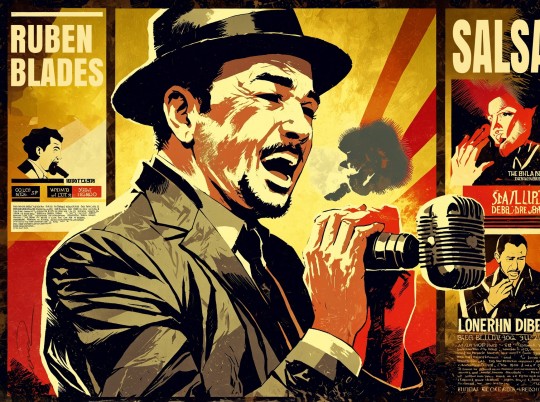
Rubén Blades is an artist whose work transcends time, geography, and language. To call him merely a salsa musician is to miss the profound depth of his message, a message that critiques the human condition with unflinching precision. His 1978 masterpiece Plástico, a standout track on the seminal album Siembra, co-created with Willie Colón, is more than a song; it is a mirror held up to society, reflecting the superficiality, materialism, and moral decay that have come to define entire generations. I was born in 1979, so the song is a year older than I am and still today is as relevant as the few years later when I first heard it in the early 1980s—a song I’m proud to say was one of many influences in my childhood. With biting yet poetic lyricism, Blades dismantles a plastic world of false values and hollow appearances—a critique that resonates just as urgently today as it did nearly half a century ago.
And therein lies the tragedy.
The Timeless Tragedy
The timelessness of Plástico is not a testament to the genius of its creator alone, though Blades deserves every accolade for his clarity of vision. It is also a damning indictment of a society that refuses to change. How is it that this song, written decades ago, could have been released today and still feel painfully relevant? The answer lies in the perpetuation of the very values Blades so eloquently dismantled: superficiality, selfishness, and a pathological obsession with instant gratification. The “pareja plástica” of his lyrics, the couple consumed by appearances and devoid of substance, may have been archetypes of their time, but they are not relics. They are the forebears of a culture that has metastasized, infecting every corner of modern life.
Blades’ critique wasn’t just about individuals—it was about systems, ideologies, and the forces that drive society toward emptiness. The young, plastic couple of Plástico came of age in the era of booming consumerism, when the Baby Boomer generation was rewriting the rules of society. And what did they write? A manifesto of entitlement, wastefulness, and anti-intellectualism. They were the torchbearers of an era that took humanity’s fringe tendencies—superficiality, waste, self-interest—and turned them into the dominant culture. They didn’t just ignore Blades’ warnings; they became the very embodiment of his critique.
A Generation's Legacy of Waste
This is where the timeline becomes especially grim. The Boomers were young when Blades wrote Plástico. They were the ones dancing to his music, oblivious or indifferent to the fact that they were the very people he was describing. Today, many of them remain firmly entrenched in positions of power—political, economic, and cultural. The selfish values they championed in their youth have only calcified with age, shaping institutions and systems that perpetuate the same superficiality, materialism, and indifference.
They are, quite literally, the same people. The same generation that consumed recklessly in the '70s and '80s, ignoring warnings about environmental collapse and societal decay, now clings to their entitlements with a death grip. They have built systems of consumption that replicate their values across generations, ensuring that their mindset continues to dominate long after they are gone. Social media, influencer culture, and the relentless churn of consumerism are not new phenomena; they are the logical evolution of a world molded by their values.
The Death of Accountability
And what of their legacy? Look around. The planet is groaning under the weight of their waste, both literal and metaphorical. Democracies teeter on the brink of collapse, eroded by the very anti-intellectualism that Carl Sagan warned about decades ago. Sagan’s voice, much like Blades’, went largely unheard, his poetic warnings about the fragility of civilization dismissed by a culture too busy chasing instant gratification to care about its own survival. Neil deGrasse Tyson and others have tried to carry his torch, but the message remains the same, as if humanity is caught in an endless loop of willful ignorance.
The Boomers’ failure to heed these warnings is not just a matter of indifference—it is active resistance. Acknowledging the truths laid bare by Blades, Sagan, and others would require confronting their own culpability. It would mean admitting that the American Dream (and its global counterparts) was built on unsustainable exploitation: of resources, of people, of truth itself. But instead of reckoning with this reality, they’ve chosen denial, doubling down on the very systems that created the mess we’re in.
Exporting the Virus
What makes this denial even more grotesque is how it has been exported. The Boomers’ consumerist ethos has gone global, infecting cultures far removed from the suburban sprawl where it was born. The “plastic couple” now exists in every corner of the world, a testament to the viral nature of their values. And yet, for all their moralizing about “personal responsibility,” this generation has shown a remarkable inability to take any responsibility for the world they’ve left behind.
Their entitlement knows no bounds. They’ve taken every last drop of the planet, metaphorically and literally, and still feel justified in demanding more. They balk at the idea of climate action, not because they don’t understand it, but because they know it would mean sacrificing the comforts they feel entitled to. They cling to archaic mentalities, not out of ignorance, but because these mentalities serve their interests.
The Breaking Point
The result? 2024 may very well be remembered as the year democracy and the environment reached their breaking points. The Boomers’ refusal to change—or even acknowledge their role in perpetuating this crisis—has pushed the world to the brink. They are the architects of a system that prioritizes short-term gains over long-term survival, and they show no signs of relinquishing their grip.
Plástico remains timeless not because humanity has failed to progress, but because one particular generation has refused to let it. Rubén Blades, Carl Sagan, and countless others have shouted into the void, their voices as clear and poetic as ever, but their warnings have gone unheeded. The plastic world Blades described in 1978 has not just endured—it has metastasized.
And so we find ourselves here, in a world built on waste and ruled by denial, staring down the collapse of everything Blades warned us about. The tragedy is not just that he was right—it’s that he still is.
#plastico#song#deep#message#spanish#ruben blades#salsa#the critical skeptic#critical thinking#social sciences#philosophy#baby boomers#boomers#instant gratification#wastefulness#timeless#entitled#sense of entitlement#carl sagan#climate change#metaphor#parallels#breaking point#apathy#superficial#superficiality#materialism#moral decay#lyricism#tragedy
0 notes
Text
"Macbeth: The Tragic Unraveling of Ambition in Shakespeare's Masterpiece"
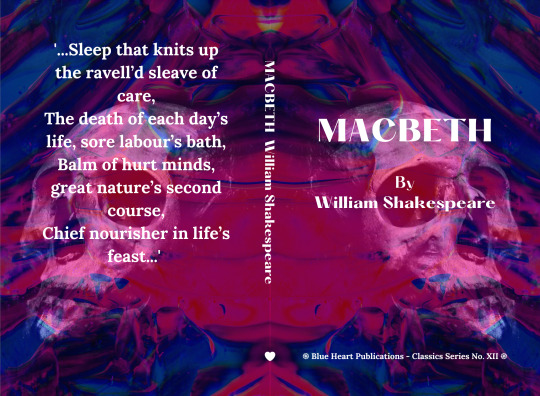
William Shakespeare's "Macbeth" is an immortal tragedy that unfurls a tapestry of human ambition, supernatural forces, and the devastating consequences of unchecked power. Published in the early 17th century, this play has transcended the confines of time, continuing to captivate audiences with its exploration of the darkest corners of the human soul. The title "Macbeth" resonates as an evocative symbol of tragedy, ambition, and the inexorable descent into moral decay.
The play revolves around Macbeth, a valiant Scottish general, whose encounter with three mysterious witches sets in motion a series of events that lead him on a treacherous path to power. As the witches prophesy Macbeth's ascent to the throne, the seeds of ambition take root in his mind, fueling a relentless pursuit of the crown. Shakespeare masterfully delves into the psychological complexities of Macbeth's character, depicting the corrosive effects of unchecked ambition on the human psyche.
The title character's tragic flaw becomes the catalyst for a series of heinous acts, including regicide, betrayal, and a descent into madness. Lady Macbeth, an equally complex figure, adds another layer to the narrative as she grapples with her own ambitions and the consequences of the couple's ruthless pursuit of power. The play unfolds with a relentless momentum, driven by a palpable sense of impending doom that permeates the air.
Shakespeare's language is a testament to his unparalleled mastery, with soliloquies and dialogues that have become iconic in the realm of English literature. The "Tomorrow, and tomorrow, and tomorrow" soliloquy, delivered by Macbeth upon learning of Lady Macbeth's death, encapsulates the play's exploration of the ephemeral nature of life and the futility of ambition. The play's evocative imagery, supernatural elements, and poetic prose contribute to its enduring impact on audiences and scholars alike.
"Macbeth" also engages with themes of fate, free will, and the influence of supernatural forces. The witches, with their cryptic prophecies, serve as agents of fate, pushing Macbeth toward his tragic destiny. The interplay between destiny and human agency adds a layer of complexity to the narrative, prompting audiences to reflect on the fine line between choice and preordained fate.
The play's enduring relevance lies in its ability to resonate with audiences across centuries. "Macbeth" is a timeless exploration of the corrupting nature of ambition and the moral consequences of unrestrained power. It transcends its historical and cultural origins, offering universal insights into the human condition.
In conclusion, "Macbeth" remains a crowning jewel in William Shakespeare's illustrious body of work. The play's exploration of ambition, moral decay, and the consequences of power showcases Shakespeare's unparalleled ability to probe the depths of the human soul. With its tragic narrative, memorable characters, and rich language, "Macbeth" continues to be a poignant and thought-provoking masterpiece that invites audiences to reflect on the enduring themes that define the human experience.
William Shakespeare's "Macbeth" is available in Amazon in paperback 10.99$ and hardcover 18.99$ editions.
Number of pages: 171
Language: English
Rating: 10/10
Link of the book!
Review By: King's Cat
#William Shakespeare#Macbeth#Tragedy#Ambition#Supernatural#Consequences of power#Fate#Moral decay#Tragic hero#Witches#Prophecies#Regicide#Madness#Lady Macbeth#Soliloquy#Iconic quotes#Tomorrow#and tomorrow#Ephemeral nature of life#Free will#Human agency#Universal themes#Timeless exploration#Cryptic prophecies#Destiny#Shakespearean language#Poetic prose#Imagery#Fine line between choice and fate#Historical play
4 notes
·
View notes
Text
#orthodox christianity#christianity#religion#abrahamic religions#did you know#news article#moral decay#women's rights#bulgaria
0 notes
Note
in the powerpuff girls episode moral decay, are you okay with professor, bubbles, and blossom not asking buttercup where she got the money?
They should have given that Buttercup doesn't have a job and wouldn't have a means to earn money unless it was illegal or at least shady.
3 notes
·
View notes
Text
Ministering with Christlike Love: Lessons from Alma 17-19
Alma 17-19 holds timeless lessons for modern-day Latter-day Saints. The chapters depict the sons of Mosiah's mission to the Lamanites and their preparation, highlighting the power of faith, hope, and service.
Ammon Saves the King’s Flock | Book of Mormon Art | Minerva Teichert available for purchase Serving and Ministering with the Love of Christ: Insights from Alma 17-19 In a world increasingly riddled with moral and spiritual challenges, the timeless lessons of Alma 17-19 shine brightly. These chapters aren’t just historical recounts—they’re a guide for modern-day Latter-day Saints who seek to…
#Alma 17-19#Ammon#Book of Mormon#Come Follow Me#Come Unto Christ#compassion#Conversation#Kindness#King Lamoni#Missionary Work#Moral Decay#Preaching#Service#Spiritual Awakening#spiritual rebellion
0 notes